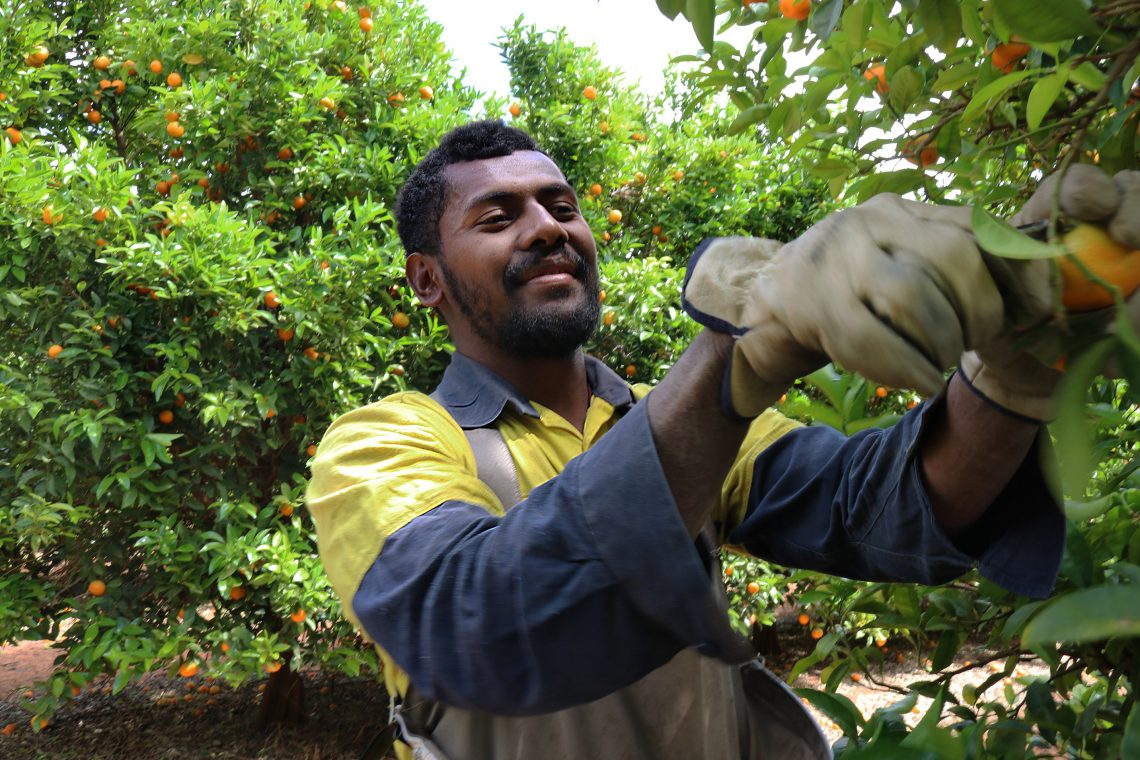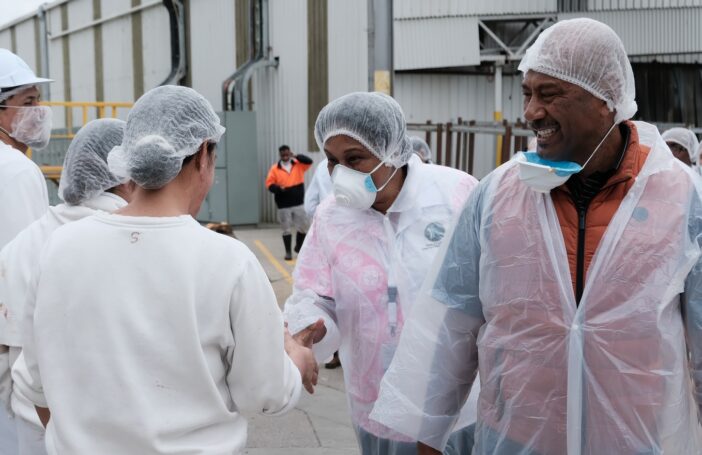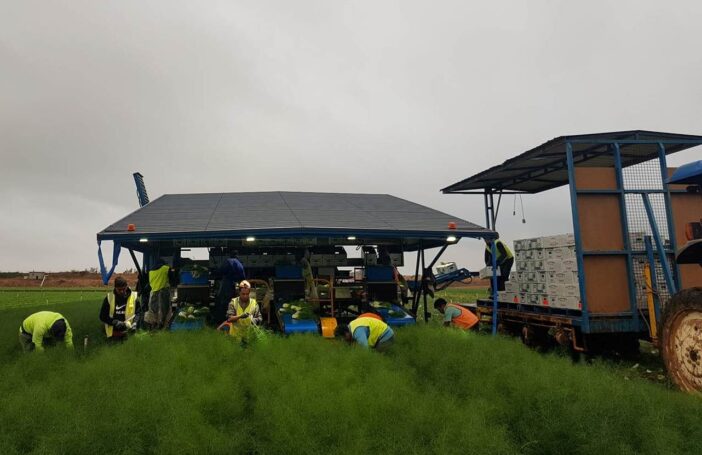The need for government to give attention to the situation of seasonal workers has been highlighted in two earlier Devpolicy blogs here and here. This blog focuses on the problems Approved Employers in the Seasonal Worker Programme (SWP) are facing in coping with the current extraordinary situation of the COVID-19 pandemic.
Visa approval statistics show that at the end of January 2020 there were 6,781 SWP workers in Australia. Approved Employers have primary responsibility for these workers but believe they have little say in working out the best options for their workers. Although there are media reports of Australians seeking work on farms, the SWP labour hire companies I have talked to report that many growers have contacted them about supplying workers. So, the demand for labour is there, but my discussions with Approved Employers also revealed several problems in the SWP that need to be addressed.
First, Approved Employers face the problem of SWP workers’ 403 visas expiring because they cannot return home due to lack of flights. The obvious solution is to extend existing visas. The New Zealand government has already done this, automatically extending to late September all temporary visas due to expire between 1 April and 9 July 2020. Instead, the Australian immigration authorities have decided to grant a bridging visa upon application to those whose visas are about to expire, pending a decision on a new visa application.
Although bridging visas can have work rights, will workers be tied to an Approved Employer as a condition of their visa? If not, they would no longer be SWP workers but could seek work with any employer. In this case, the workers’ rights under the SWP would also expire under the bridging visa. For example, their employer would no longer be obliged to provide them with accommodation. As well as allowing workers to apply for bridging visas, SWP workers’ 403 visas should simply be extended for a set period.
Second, much more flexible, alternative accommodation arrangements are needed. Additional room is needed to enable workers to be placed in isolation. And more space is needed for existing workers to reduce the risk of contracting COVID-19 by maintaining better social distancing. The current SWP process for approving accommodation arrangements is inflexible and includes many minor or petty changes such as replacing missing curtain rings. SWP approval is also drawn out because it is managed from a distance in Canberra.
The third problem Approved Employers face is that the SWP has stopped processing recruitment plans until the current travel bans are lifted. Putting the recruitment plans on hold will cause major delays in getting SWP workers back for the next season, when borders are reopened. This is due to the time the SWP takes to approve such plans and the need for further labour market testing. Backpackers have been locked out and when international travel resumes, their numbers may be much lower. SWP workers will be needed to fill the gap.
Unlike New Zealand, Australia does not have local area data collection directly from growers to identify the potential demand for seasonal workers in horticulture. So local intelligence, based on the assessment of growers that are asking for workers, is needed in the form of recruitment plans. If Approved Employers are willing to take the risk, recruitment plans should continue to be processed. Overall, consistent with the rhetoric of the prime minister, the aim should be to allow farmers to recover as quickly as possible post-shutdown.
Fourth, Approved Employers who are labour hire companies have the scope to redeploy workers to meet the need for labour on other farms in the same area or interstate. These moves will of course require two weeks isolation for anyone crossing state boundaries declared closed. A contingency fund needs to be set up to cover these expenses. One proposal is for Approved Employers to cover half of the costs of accommodating workers during this period, using the funds to ensure, among other things, that workers have nutritious food to keep up their immunity level.
The New Zealand government requires the employers of Recognised Seasonal Employer (RSE) scheme workers, who have to isolate for 14 days, to provide appropriate accommodation and pastoral care facilities. Costs incurred during any self-isolation period, including accommodation and living costs, are the responsibility of the worker, as during the normal course of employment. However, RSE workers are eligible for the sick-leave scheme, part of the government’s COVID-19 Economic Response Package. Employers are required to apply for the subsidy of NZ$585.50 per worker per week.
Fifth, much better, two-way communication channels need to be set up to seek the suggestions of Approved Employers and to replace the top-down SWP guidelines that were clearly intended for a very different operating environment. Sending-country liaison officers need a central point of contact to enable them to get accurate and up-to-date information to counter the panic messages generated by social media. This information needs to be in the language that workers can understand easily.
Sixth, Approved Employers through their newly formed Approved Employers Association (AEA) should agree on a uniform policy that all Approved Employers are expected to follow. This policy needs to be put into fact sheets that are translated into the worker’s language of preference.
The rigidity of the SWP compared with New Zealand’s RSE scheme has been noted in the past here and here. This rigidity stands in stark contrast to the minimal regulation of backpackers and international students. Now is the time to develop a more flexible set of arrangements through learning by doing, based on close consultation with and involvement of Approved Employers.
Australia’s SWP has suffered, I have long argued, from the lack of a strong voice for employers. Now they have the AEA. The current crisis represents the perfect opportunity for the AEA to come of age, and for the Australian government to enter into a high-level dialogue with the AEA to deliver the required outcomes. The aim should be to better meet the needs of growers to ensure a reliable supply of fresh food for Australia’s population and to protect the health and livelihoods of the seasonal workers.
This post is part of the #COVID-19 and the Pacific series.





In a recent development, we have two cases in the NT particularly relevant to the conversation around Labour Market Testing. Specifically referring to the desire to offer Australians work first, which in the following cases, demonstrates the glaring necessity of being able to redeploy Seasonal Workers quickly during this pandemic.
A melon grower in the NT was due to see his five Timorese Seasonal Workers arrive late March. They didn’t travel. He advised us he would give some locals an opportunity. He asked 11 local people to go to his farm to meet and discuss the job. One of them turned up, then declined the opportunity.
In another case where four local NT hospitality workers who were laid off as their resort was shut down were offered harvest work.
They were due to start on 30th March at a citrus and mango operation. Only one person turned up, another contracted tonsillitis on the weekend, and his girlfriend stayed home to look after him . The forth candidate had his birthday that day so he took the day off.. without calling the employer or our staff.
The one person who did start, emailed our staff on the first day to say that he could not go back anymore, because he would have to have a shower everyday as soon as he got home, and would have to wash his work clothes daily.
I’m looking forward to finding out how many Australians will forego the $550 per week Job Seeker payments to actually travel out to the regions and pick fruit.
The public servants that are administering these programs are constrained by pre-COVID-19 rules and regulations and have not been given sufficient discretion or scope to adapt to meet the fast changing circumstances.
I had hoped Home Affairs would announce a blanket extension of existing visas, but it appears the announcement on the weekend (that visas would be extended) referred to an extension of the term of bridging visas, not to a simpler process. Because their visas expired on 28 March, our six workers mentioned above have been unable to work for ten days, and Home Affairs have put them in a queue and advised they will be interviewed for their new bridging visas on 15 April. We don’t know, and cannot find out, how long it will take after that to grant the visa. I am disappointed at their indifference to the plight and wellbeing of these workers who will be vital to ensuring Australia’s fresh food supplies in the coming months.
I’m reminded of a joke women passed around in the 70’s about the famous dance couple, Fred Astaire and Ginger Rogers. Fred Astaire got much of the credit, but my female friends would remind me that Ginger Rogers did everything Fred Astaire did, but backwards, and in high heels. Dancing to the tune of of the government regulations around seasonal workers and visas is hard enough in normal times, but suddenly COVID-19 has come along and we find ourselves dancing backwards and in high heels, but no one in government has told the DJ to change the dance steps or slow down the music.
I have made several representations to minister’s offices about ‘essential service’ status for seasonal workers, about reducing red tape and the urgent need to extend the 403 visas for our vulnerable seasonal workers. I have not had any response to any of my inquiries. Instead we have been left to figure things out for ourselves. It would take a one line email from the minister to ‘extend all 403 visas for 6 months’ and I cannot understand why this has not happened.
Instead we have commenced the task of applying for the first six of nearly a thousand bridging visas. On Monday we submitted six applications for workers whose visas expired on Saturday. The workers have (correctly) been stood down by the farm where they were employed, as they are currently illegal, and no longer have work rights, so we are paying their rent, insurance, travel and food bills. They are a long way from home with no job, no legal status and no idea when they might see their family again.
The bridging visa applications were returned from the Hobart office of Home Affairs where we had lodged them and where the original 403 visas were issued. They advised we had to submit the visas to the state Home Affairs offices where the workers reside. These workers are in WA so we sent the applications to the Perth office. They forwarded them to the Brisbane office because our company’s registered office is in Qld. Brisbane wrote to us saying the 956a forms we submitted with the original 403 applications are not valid for the BV applications and we need to get new ones. It is now five days since the applications were submitted and we are no closer to getting these workers back to work. State offices of Home Affairs do not seem to be aware of our workers or their need for new visas.
Andrew,
Many thanks for the details of the rigidities I referred to in my blog. I hope other Approved Employers can also provide details of the immediate difficulties they are facing in getting official approval for the new arrangements they have worked out to minimise the effect on workers.
For those readers who are not Approved Employers, I should explain that the new Deed of Agreement between the Department of Employment, Skills, Small and Family Business and Approved Employers came into effect from 1 January 2020, after many months of consultations. A sample of the Deed can be found here: https://docs.employment.gov.au/documents/seasonal-worker-programme-deed-agreement-effective-1-january-2020
Richard Curtain
I am compelled to share the experience we are having with the impracticalities of the Deed in this very challenging time. The following is to illustrate the complete and utter dismay we are experiencing with a system that does not serve the people it was set up to … Seasonal Workers, Growers and Approved Employers.
Four women from Vanuatu finished their contract in Kununurra and were due to leave 23 March. The last flight to Vanuatu was cancelled and they are now stuck in Sydney. We contacted numerous AEs to find work for them and have found employment near Mildura, with another Approved Employer Labour Hire Service Provider.
The ladies’ visas have expired (we have applied for the bridging visa) and both the AE and the SWs are anxious to start their new work and get out of Sydney.
However, the variation won’t be looked at until the pending accommodation form for Mildura is approved. The accommodation form has been submitted by the other AE Labour Hire Company and is waiting approval. We need to wait for that approval and then we have to apply, in our own name, to lodge the same accommodation form.
As a result of the expired visas we have been advised by our Contract Manager we now must submit a Recruitment Plan … with Labour Market Testing … yet the department advised it was not looking at any new Recruitment Plans. Not only is this absolutely ludicrous its wasting more time (and the Seasonal Workers’ money) and preventing the women from working!
The Deed that we have signed up for has failed magnificently during this crisis. Given that policymakers and senior Department officials do not heed advice, suggestions or recommendations from AEs (who are legitimately building this program), with absolute genuine priority for the welfare of the SWs and our grower clients, nothing is being done to make this function efficiently.
We have decided to transfer the SWs in Sydney to the AE in Mildura in an attempt to expedite the ladies’ transition back into work (we understood this would take less time to be approved). However, we remain bogged down in government red tape, painfully slow processing and general lack of outcome-oriented practices … despite the rhetoric from government agencies.